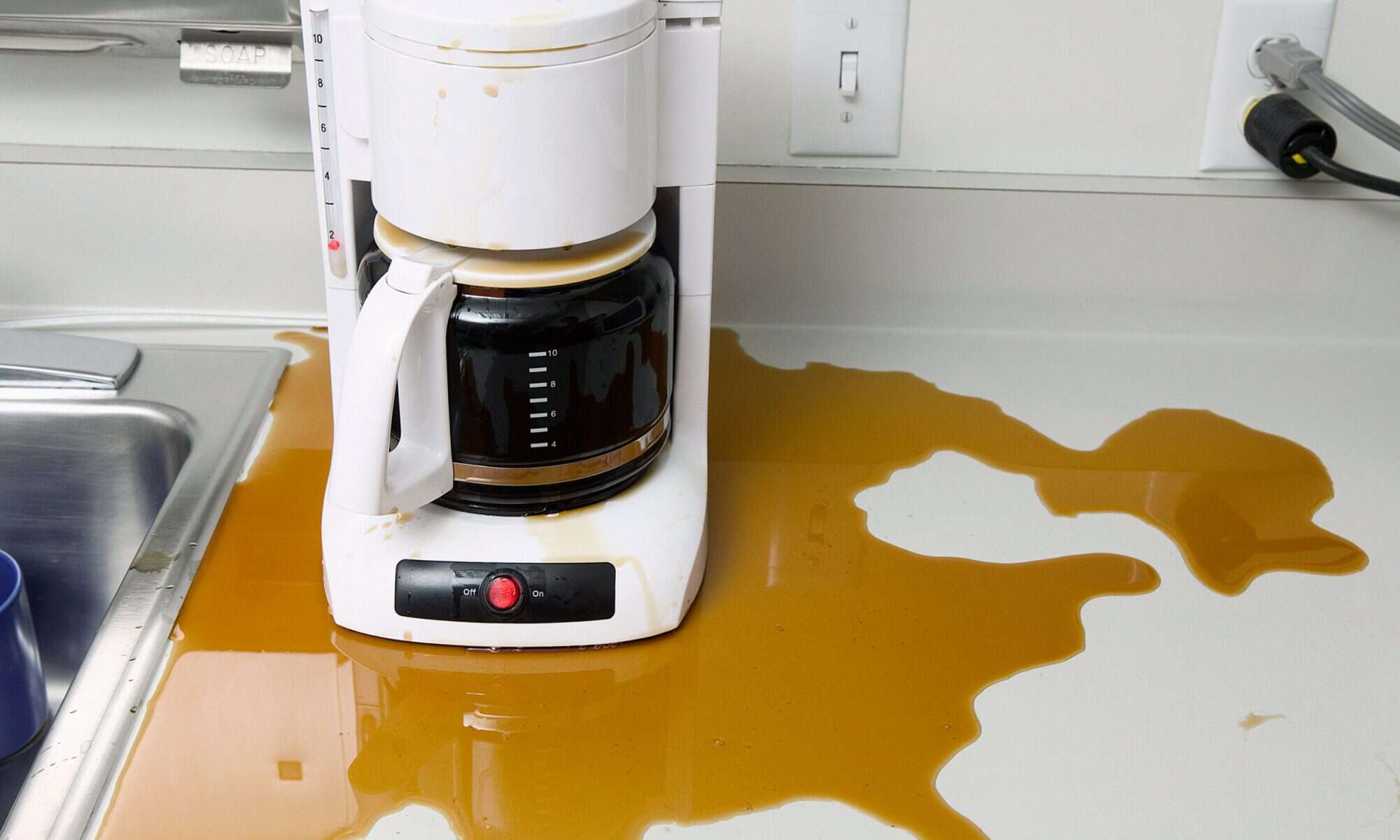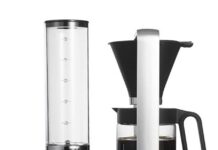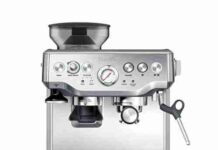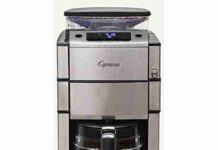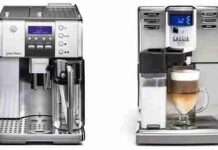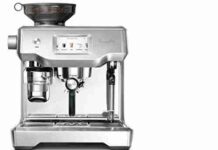Coffee makers are an essential part of our daily routine, providing us with that much-needed burst of energy to start the day. However, we often find ourselves facing the frustrating situation where our beloved coffee maker just stops working without any warning. It’s as if our trusted companion decided to go on strike. In this article, we explore the mysterious reasons behind this common occurrence, unveiling the culprits that could be to blame and offering practical solutions to get our coffee machines buzzing once again. With our expert insight, you’ll be equipped to face this annoyance head-on and restore the joy of that perfect cup of joe at home.
This image is property of cdn.shopify.com.
Common Issues with Coffee Makers
Power Supply Problems
One of the most common issues faced by coffee maker owners is power supply problems. Sometimes, the machine may not turn on or suddenly shuts off. This can be caused by a faulty power cord, a loose connection, or a blown fuse. To troubleshoot this issue, check the power cord for any visible damage and ensure that it is securely plugged into a working outlet. If the cord appears to be damaged, replace it immediately. Additionally, inspect the fuse box, and if you find a blown fuse, replace it with a new one of the same rating.
Heating Element Failure
Another common issue that coffee maker owners encounter is heating element failure. The heating element is responsible for heating the water to the desired temperature for brewing coffee. If it malfunctions, the coffee maker may not heat up at all or fail to reach the proper brewing temperature. To address this issue, you may need to replace the heating element. Consult the manufacturer’s manual or contact customer support for guidance on identifying and replacing the faulty heating element.
Clogged Water Line
Over time, mineral deposits from the water can start clogging the water line of your coffee maker. This can negatively affect the water flow and result in weak or incomplete brewing. To fix this issue, you can descale your coffee maker using a descaling solution or vinegar. Follow the instructions provided by the manufacturer to ensure proper cleaning and prevent any damage to the machine.
Malfunctioning Control Panel
If your coffee maker has a control panel for programming brew settings or adjusting the temperature, a malfunction in this area can prevent the machine from functioning properly. This may include issues such as unresponsive buttons or inaccurate display readings. Try resetting the control panel by unplugging the machine, waiting for a few minutes, and then plugging it back in. If the problem persists, you may need to contact the manufacturer for further assistance or consider getting the control panel repaired or replaced.
Water Flow Problems
Clogged Filter
A clogged filter can lead to a decreased water flow in your coffee maker. This can result in weak or under-extracted coffee. To address this issue, remove the filter and inspect it for any visible debris or clogs. Gently clean the filter or replace it if necessary. Regularly cleaning or replacing the filter, as per the manufacturer’s instructions, is essential for maintaining optimal water flow in your coffee maker.
Faulty Water Pump
The water pump is responsible for moving the water from the reservoir to the brewing chamber. If the pump becomes faulty, it can disrupt the water flow and prevent the coffee maker from brewing properly. Check the water pump for any visible signs of damage or blockage. If necessary, consult the manual or reach out to customer support to troubleshoot and potentially replace the water pump.
Blocked Water Inlet Valve
The water inlet valve controls the flow of water from the reservoir into the brewing chamber. If it becomes blocked or clogged with debris, the water flow can be significantly reduced or completely hindered. To address this issue, carefully inspect the water inlet valve and clean it thoroughly. If the valve is damaged beyond repair, you may need to replace it with a new one.
This image is property of storables.com.
Electrical Issues
Blown Fuse
A blown fuse can cause the coffee maker to suddenly stop working. If you experience a complete loss of power or notice that the machine is not turning on, check the fuse box. If you find a blown fuse, replace it with a new one of the same rating. Furthermore, ensure that the coffee maker is plugged into a functional outlet and the power cord is intact. If the problem persists, it may indicate a larger electrical issue that requires professional assistance.
Faulty Wiring
Faulty wiring can also lead to coffee maker malfunctions. Over time, the wiring inside the machine may become damaged or loose, causing electrical issues. If you suspect faulty wiring, it is crucial to seek professional help for inspection and repair. Do not attempt to repair the wiring yourself as it can be dangerous and may void the warranty of your coffee maker.
Defective Power Button
If the power button on your coffee maker is not functioning properly, it can hinder the machine from turning on or off. Check the power button for any physical damage or signs of wear. If needed, consult the manufacturer’s instructions on how to replace the power button or contact their customer support for further guidance.
Mold and Mineral Build-up
Accumulated Mineral Deposits
Mineral deposits from the water, such as calcium and magnesium, can accumulate over time inside your coffee maker. These deposits can lead to clogs, affect the taste of your coffee, and hinder the machine’s performance. To tackle this issue, regularly clean and descale your coffee maker using a descaling solution or vinegar. Follow the manufacturer’s instructions to ensure thorough cleaning and prevent any damage to the machine.
Mold Growth in Water Reservoir or Internal Parts
Mold can also be a concern in coffee makers, particularly in areas that are frequently exposed to moisture. If you notice a musty or unpleasant odor, it may be indicative of mold growth. Clean the water reservoir and other removable parts of the coffee maker regularly with warm soapy water to prevent mold growth. Consider using a brush or toothbrush to reach narrow areas. Proper drying after cleaning is essential to minimize moisture and inhibit mold growth.
This image is property of imagesvc.meredithcorp.io.
Overheating and Burnt Smell
Overheating Thermostat
If your coffee maker emits a burnt smell or shuts off unexpectedly, it may be due to an overheating thermostat. The thermostat is designed to regulate the brewing temperature and protect the machine from excessive heat. If it malfunctions, the coffee maker may overheat, leading to burnt smells or even potential damage. Contact the manufacturer’s customer support for assistance or consider taking the coffee maker to a professional for evaluation and repair.
Burnt Heating Element
The heating element, responsible for warming the water in the coffee maker, can burn out over time. A burnt heating element can lead to a noticeable burnt smell and render the machine ineffective in brewing coffee. If you suspect a burnt heating element, it may be necessary to replace it. Consult the manufacturer’s instructions or seek professional assistance to safely replace the heating element.
Mechanical Problems
Broken or Worn-out Components
Mechanical problems can occur if certain components within the coffee maker become broken or worn-out. This may include issues with the brew basket, carafe lid, or other movable parts. Carefully inspect these components for any signs of damage or wear. If necessary, contact the manufacturer’s customer support for replacement parts or consult a professional for repair.
Motor Failure
The motor in a coffee maker is responsible for powering various moving parts, such as the grinder or pump. If the motor fails, it can result in the machine’s inability to perform essential brewing functions. In such cases, professional assistance is often required to diagnose and repair the motor or replace it if necessary.
Leaking Seals
Leaking seals can lead to water leakage during the brewing process, resulting in messy countertops and potential damage to the machine. Check the seals, such as those around the water reservoir or carafe, for any visible signs of wear or damage. Replace any worn-out or damaged seals promptly to prevent leaks and maintain the proper functioning of your coffee maker.
This image is property of i.ytimg.com.
Malfunctioning Sensors
Temperature Sensor Failure
The temperature sensor is responsible for monitoring the water temperature during the brewing process. If it fails, it can affect the brewing consistency and quality. Symptoms of temperature sensor failure may include inconsistent water temperature or the machine shutting off unexpectedly. Contact the manufacturer or a professional technician to diagnose and replace the faulty temperature sensor.
Water Level Sensor Malfunction
The water level sensor is essential for determining the correct water level within the coffee maker. If it malfunctions, the machine may not recognize the presence of water, preventing it from brewing properly. A malfunctioning water level sensor can lead to dry brewing or incomplete extraction. Consult the manufacturer’s manual or seek professional assistance to troubleshoot and address the issue.
Defective Circuit Board
Short-circuits
Short-circuits within the circuit board can cause the coffee maker to stop working abruptly. Signs of a short-circuit may include sparks, burning smells, or the machine tripping the circuit breaker. In such cases, it is crucial to disconnect the machine from the power source immediately and seek professional assistance for repairs.
Damaged Components
Damage to the components on the circuit board can disrupt the electrical flow within the coffee maker. Components may become damaged due to age, misuse, or electrical surges. If you suspect damaged components, it is recommended to consult a professional technician or contact the manufacturer’s customer support for guidance on repairs or replacements.
This image is property of i.ytimg.com.
Improper Maintenance
Lack of Cleaning
Regular cleaning is crucial for the proper maintenance of a coffee maker. Neglecting to clean the machine can lead to a buildup of coffee oils, mineral deposits, and mold. This buildup can negatively impact the taste of your coffee and hinder the machine’s performance. Follow the manufacturer’s instructions for cleaning and descaling the coffee maker to ensure optimal functionality and longevity.
Usage of Incorrect Water Filters
Using incorrect water filters can affect the water quality and flow within the coffee maker. Some machines require specific filters to remove impurities from the water. Using the wrong filter or failing to replace it when needed can cause clogs and affect the taste of your coffee. Refer to the manufacturer’s recommendations to ensure you are using the appropriate water filter for your specific coffee maker.
User Error or Accidents
Spillage and Water Damage
Accidental spills or exposure to excessive moisture can damage the coffee maker and lead to malfunctions. If liquids seep into the internal components of the machine, it can result in electrical issues or corrosion. To prevent damages, always handle the coffee maker with care, ensure the carafe is securely placed, and promptly clean any spills or water damage.
Incorrect Handling or Misuse
Improper handling or misuse of the coffee maker can also cause it to stop working. This may include overfilling the water reservoir, placing the wrong coffee-to-water ratio, or using the machine for unintended purposes. Always refer to the manufacturer’s instructions and guidelines to ensure proper handling, brewing, and maintenance of your coffee maker.
In conclusion, various factors can contribute to a coffee maker suddenly stopping working. It is important to identify and address these issues promptly to ensure the longevity and optimal performance of your coffee maker. Regular maintenance, including cleaning, descaling, and following manufacturer guidelines, can go a long way in preventing these common issues. If troubleshooting steps do not resolve the problem, reaching out to the manufacturer’s customer support or seeking professional assistance is advisable to prevent further damage and ensure a satisfying coffee brewing experience.





